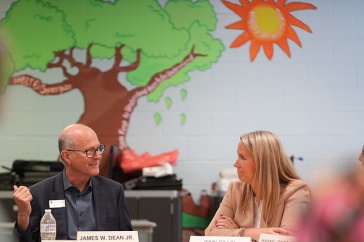
John W. Small, a '76 UNH graduate and former vice chair of the University System of New Hampshire (USNH) board of trustees, has been unanimously elected to chair the USNH board.
Small was first appointed to the board by then-Gov. John Lynch in 2010, following his retirement as managing director at the global human resources consultant Towers Perrin. Since 2010 Small has served on various board committees , leading initiatives that resulted in substantial economies of scale for the university system and making changes in governance. His work has helped USNH with both financial and operational effectiveness.
As chair, Small says he aims to leverage the board’s depth of talent to implement strategic, financial and other initiatives critical to the success of USNH while facilitating board discussions on top priorities for the next several years. This includes continuing to enhance relations with state government, employers in New Hampshire and the citizens of the state.
With his 30-plus years of experience in human resources consulting, Small appears well suited to his first assignment, the search to replace UNH President Mark Huddleston, who will retire in 2018. “That is the biggest responsibility of the board, hiring the right leadership,” says Small, who also chairs the search committee. “Our job is to find the next great leader to take UNH into the future.”
Small praises Huddleston for his many accomplishments during his tenure: record enrollment, a dramatic increase in private philanthropy, the creation of the Peter T. Paul School of Business and Economics, and many significant enhancements to the physical facilities that are so important in attracting and retaining students, among others.
“UNH has come a long way over the last 10 years.” Small says. “We’re in a great place, thanks to all the progress Mark and his team have made. Now it is important for us to find a leader who recognizes the strong position UNH is in and has the vision to move us to the next level of excellence, maintaining our competitiveness in the ever-changing environment of higher education.”
Small also hopes to promote greater pride in USNH institutions. “You’ll find a tremendous amount of pride within our institutions and with alumni and citizens, but I would like everyone in New Hampshire to share that same pride,” Small says. “I think we do a good job of telling our story at times, but we could do so much more consistently.
“We’re not going to get to where we ultimately want to be in one year, but the more people who know the many positive things about UNH, Plymouth State, Keene State and Granite State College, the more they will see us as critical to economic and workforce development for New Hampshire,” Small says. “That’s the kind of partnership and shared vision we would love to have with the state government, employers and our citizens.”
“When you look at all the options — campuses, schools, programs, transfers — it makes me really proud that the system has such diverse possibilities.”
Partnerships do exist now, Small stresses, and some of the ways that USNH is effective for New Hampshire are recognized. He offers two examples that have not been widely reported: The university system has the lowest per student administrative cost of all the state universities in New England. And, while USNH is among the more expensive state systems, it has the lowest default rate on student loans in the country. This tells us that USNH graduates are getting jobs.
Small plans to continue board efforts to increase access and affordability for New Hampshire students, citing the success in fundraising at UNH that enabled the launch of Granite Guarantee, which ensures all full-time, first-year New Hampshire students receiving federal Pell grants will pay no tuition to attend the UNH Durham and UNH Manchester.
He also lauds the “amazing job” USNH does of providing options for students to learn. He lists UNH’s land, sea and space-grant mission, its vast research opportunities and solid liberal arts offerings; Plymouth State’s new “cluster model” for workforce development; Keene State’s liberal arts and processional programs; Granite State’s array of online and in-person courses easily available to those across the state; and UNH Manchester’s urban campus access. And, the dual admittance program that allows smooth transitions for community college students to any USNH institution.
“When you look at all the options — campuses, schools, programs, transfers — it makes me really proud that the system has such diverse possibilities,” Small says. “It shows we’re a system, and we’re in this together.”
According to Small, the board is also working with the state and employers to address the pressing need for highly skilled workers. “We are well aware that an educated workforce is a critical part of any organization's decision to operate in our state,” he says.
But the declining population of high school graduates, particularly in the Northeast, presents a significant challenge to developing the needed volume of that workforce. “If under 10 percent of our budget comes from the state, where does most of the remainder come from? Enrollment,” Small says. “Almost any public university in the country is dependent on enrollment even if there is substantial state support, which has been reduced in many states over the past few years.
“If we want to hold our ground or grow at a reasonable rate, we’ve got to win more,” Small says. “That comes down to how we market our institutions.” The USNH board of trustees has made specific allocations during the past several years to improve those marketing efforts to enhance student enrollment.
Finally, Small says, fiscal responsibility is a tremendous part of the board’s role. “Our state financial support is the lowest of all states in the U.S., and in New Hampshire, many entities are competing for the state’s limited dollars. Throughout the years that has required strong financial discipline by the board, and we take our financial well-being very seriously.”
Joining Small to lead the 29-member board is Vice Chairman Joseph Morone, president and chief executive officer of Albany International Corporation in Rochester, New Hampshire, and Secretary Amy Begg, deputy director of research at Harvard University.
Small is a member of the UNH Foundation board of directors and a former member of the advisory committee of the Museum of the White Mountains at Plymouth State University. He was a member of the Towers Perrin board of directors from 2004–2010.
-
Written By:
Jody Record ’95 | Communications and Public Affairs | jody.record@unh.edu
















































